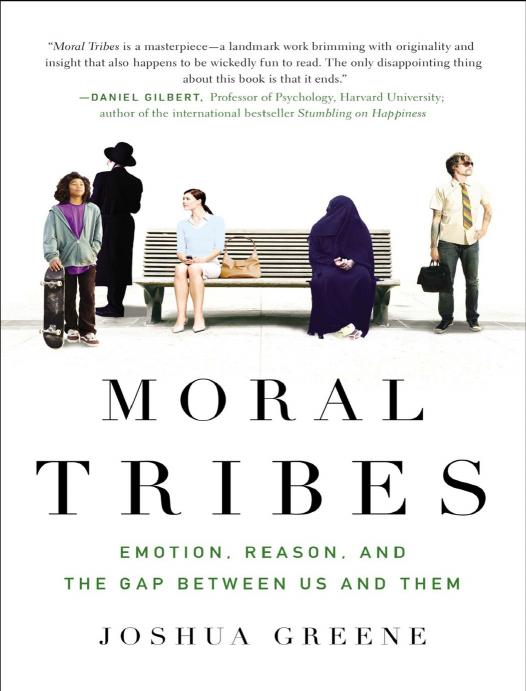Moral Tribes by Joshua Greene

Author:Joshua Greene
Language: eng
Format: mobi, epub, azw3, pdf
Publisher: Penguin Group, USA
Published: 2013-10-31T04:00:00+00:00
Figure 9.13. In the famous Müller-Lyer illusion two lines of equal length appear to differ in length.
In figure 9.13 the top horizontal line appears to be longer than the bottom one, but they are actually the same length. Just as visual illusions reveal the structure of visual cognition, bizarre moral dilemmas reveal the structure of moral cognition. They are moral illusions—revealing for the manner in which they mislead us.
Trolley dilemmas may be weird, but there are real-world moral problems that mirror their weirdness, with life-and-death consequences. Once again, the footbridge dilemma is weird because it’s a case in which a prototypically violent act promotes the greater good. This rarely happens in ordinary life, but it happens regularly in the domain of bioethics, where modern knowledge and technology give us the opportunity to do pseudo-violent things that promote the greater good.
Consider, once again, the American Medical Association’s stance on physician-assisted suicide. The AMA has essentially endorsed both the Doctrine of Double Effect and the Doctrine of Doing and Allowing. If I’m right, the AMA is essentially endorsing the operating characteristics of a myopic module. As a result, chronically ill patients may suffer simply because we lack the fortitude to actively, intentionally, and personally do what’s best for them—and what they want for themselves. (This is not to say, of course, that there aren’t utilitarian reasons for being extremely cautious when it comes to ending patients’ lives. But the AMA is categorically opposed to physician-assisted suicide as a matter of “principle.”) The gizmo’s operating characteristics may also influence people’s attitudes toward mandatory vaccination and policies surrounding organ donation and abortion. Indeed, trolleyology was born as part of a discussion about abortion and the Doctrine of Double Effect.
Beyond medicine, the gizmo’s operating characteristics may influence our attitudes toward capital punishment, torture, and war. In all of these cases, violent or quasi-violent actions that push our moral buttons may serve the greater good, and we may reject these actions not because we’ve worked through all of the relevant moral considerations, but because of how they feel. And just as our moral alarm bells may overreact by being blind to the benefits of certain alarming actions, our alarm bells may underreact by being blind to the costs of actions that are not alarming. For example, when we harm people (including future people) by harming the environment, it’s almost always as a side effect, often passive, and never through the direct application of personal force to another person. If harming the environment felt like pushing someone off a footbridge, our planet might be in much better shape.*
It’s worth noting that skepticism concerning the wisdom of the gizmo cuts both ways politically. Our alarm bells may fuel opposition to physician-assisted suicide and abortion, but they may also fuel opposition to torture and capital punishment. I am not, here, coming out for or against any of these policies. Rather, I’m suggesting that we train ourselves to think about them differently.
It’s good that we’re alarmed by acts of violence. But the automatic emotional gizmos in our brains are not infinitely wise.
Download
Moral Tribes by Joshua Greene.epub
Moral Tribes by Joshua Greene.azw3
Moral Tribes by Joshua Greene.pdf
This site does not store any files on its server. We only index and link to content provided by other sites. Please contact the content providers to delete copyright contents if any and email us, we'll remove relevant links or contents immediately.
The remains of the day by Kazuo Ishiguro(8900)
Tools of Titans by Timothy Ferriss(8316)
Giovanni's Room by James Baldwin(7264)
The Black Swan by Nassim Nicholas Taleb(7067)
Inner Engineering: A Yogi's Guide to Joy by Sadhguru(6759)
The Way of Zen by Alan W. Watts(6562)
Asking the Right Questions: A Guide to Critical Thinking by M. Neil Browne & Stuart M. Keeley(5717)
The Power of Now: A Guide to Spiritual Enlightenment by Eckhart Tolle(5686)
The Six Wives Of Henry VIII (WOMEN IN HISTORY) by Fraser Antonia(5462)
Astrophysics for People in a Hurry by Neil DeGrasse Tyson(5159)
Housekeeping by Marilynne Robinson(4404)
12 Rules for Life by Jordan B. Peterson(4280)
Double Down (Diary of a Wimpy Kid Book 11) by Jeff Kinney(4245)
The Ethical Slut by Janet W. Hardy(4221)
Skin in the Game by Nassim Nicholas Taleb(4209)
Ikigai by Héctor García & Francesc Miralles(4178)
The Art of Happiness by The Dalai Lama(4102)
Skin in the Game: Hidden Asymmetries in Daily Life by Nassim Nicholas Taleb(3965)
Walking by Henry David Thoreau(3927)
